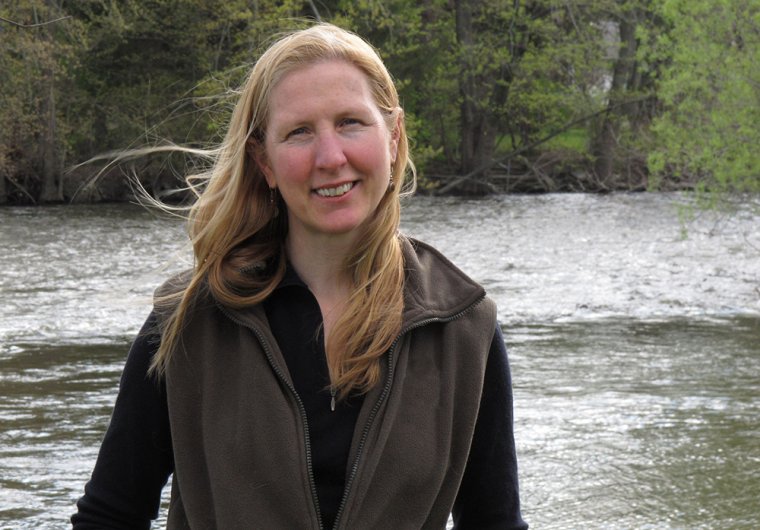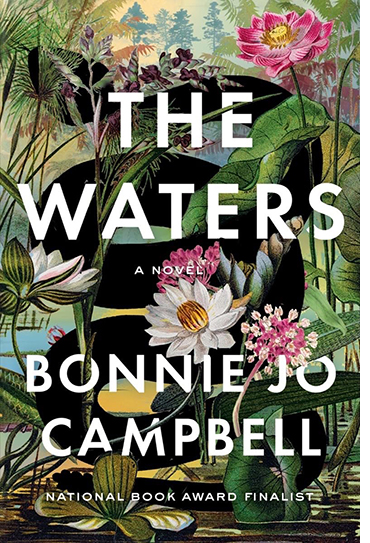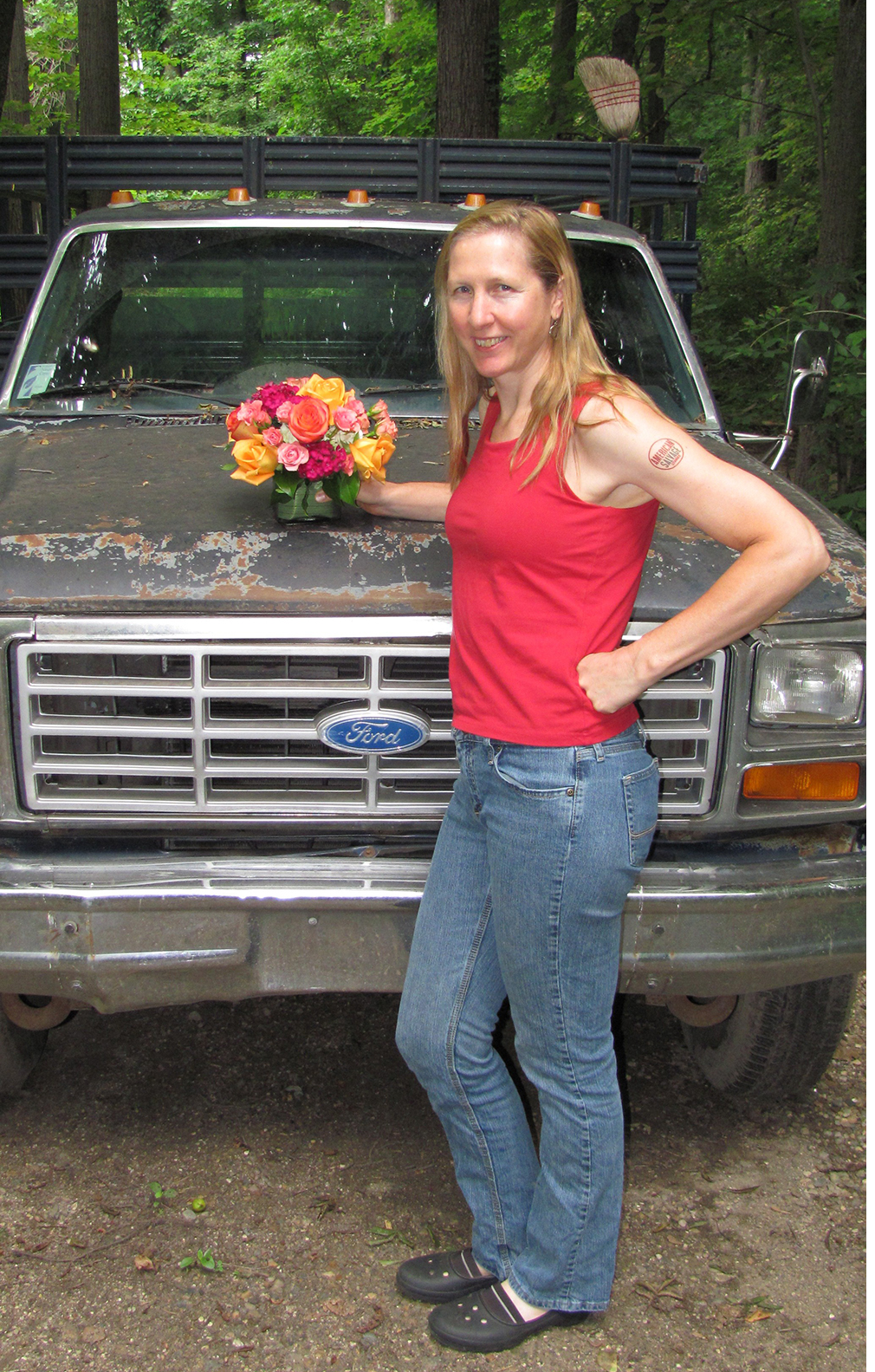A few hours after I first met Bonnie Jo Campbell, she knocked on the door of my dorm room at a small college in Western Oregon. We’d both just joined the faculty of a low-residency MFA program and Bonnie was about to read to the gathering of students and teachers. She came in and asked if she could borrow a hair dryer. She’d never used one before. Bonnie Jo picked up a strand of her long, wet hair and asked me what she might expect blow-drying would do that air-drying couldn’t. Right then I hoped we’d be fast friends, as I understood that it’s both refreshing and liberating to be in Bonnie Jo’s presence. She is authentically herself without apology or defensiveness. Her friendly candor draws you close, though she’s also quick to call out bullshit when she sniffs it. These are traits that muscle through Bonnie’s prose as well: Her writing is direct, gutsy, and bold, while her characters are industrious, determined, and, just under the surface, exquisitely vulnerable. In her encomium for The Waters, out now from W. W. Norton, poet Diane Seuss writes that Bonnie Jo Campbell’s newest book is “muddy and bloody; it swallows us whole and effervesces into fog. It is the magic we’d inhabit if we still believed in magic, the dream we’d have if we could sleep.”

Bonnie Jo Campbell (Credit: Bradley Pines)
Bonnie Jo is as comfortable with a Pulaski axe in her hands as she is with a pen—she and her husband Christopher are rehabbing a fifth house in Kalamazoo, Michigan, Bonnie’s hometown, in an effort to brighten up their neighborhood. (“Figuring out building materials and how dwellings are put together is not so different from writing stories,” she tells me.) Earlier the couple turned a condemned shack on the Kalamazoo River into Bonnie Jo’s writing studio. Rural Michigan serves as the setting for many of her short stories and novels, including Once Upon a River (Norton, 2011), a river odyssey, featuring a sixteen-year-old protagonist, that the New York Times Book Review called “an excellent American parable about the consequences of our favorite ideal, freedom.” An earlier short fiction collection, American Salvage (Wayne State University Press, 2009), was a finalist for the National Book Awards and the National Book Critics Circle Awards, spinning her into meteoric literary fame. Bonnie Jo is also the author of Women and Other Animals (University of Massachusetts Press, 1999), which won the AWP Award for Short Fiction, the novel Q Road (Scribner, 2002), and the story collection Mothers, Tell Your Daughters (Norton, 2015). She was a 2011 Guggenheim fellow and a 2019 recipient of the Mark Twain Award from the Society for the Study of Midwestern Literature, and she has also been awarded a Pushcart prize.
Bonnie Jo and I recently discussed her latest endeavor, The Waters, an ethereal and transporting novel with a narrative that rings with fairy-tale magic. “It’s a story of an old witch who lives on an island and has three daughters, and the youngest daughter is very beautiful and foolish,” she tells me. Yes, the book is that. And it’s so much more—a wild and wholly satisfying ride through one family’s gnarliest business.
When I got Bonnie Jo on the phone, she told me that during our conversation she’d be shoveling and raking gravel in her driveway while watching over her two donkeys grazing not far away, “that way I won’t be nervous while we talk.”
On that note, how does physical labor—working with your hands and your body—play into your writing process?
I feel most like myself when I’m moving all my muscles, whether it’s walking to the post office, or raking the stones in the driveway to get a beautiful crown that will repel water, or trimming my donkeys’ hooves, which sometimes requires all-out wrestling. I find it challenging to sit still at my table and write—I did get diagnosed with ADHD along the way, and I sit on an exercise ball so I can move around—but when my writing is going well, I feel as though my body, as well as my mind, is somehow involved in the effort. When I can bring my whole self to the endeavor of creating characters, settings, and situations, nothing could be better.
While I do see writing as a craft and an exploration of language, for me the creation of stories is primarily about creating a reflection or translation of, or response to, the world, and all my craft and language needs to serve that purpose. For example, I have rarely been able to do writing exercises because I need to be intensely—desperately, even—involved in what I am writing about. That isn’t to say my work isn’t also playful or inventive or a commentary on other works of literature—it is all that too, I hope—but primarily my literary body of work has a strong throughline to human bodies and to the physical work we do moving through this real world of creatures, places, and things.
The Waters is a departure from that hard-bitten physical world you champion in your earlier stories and novels. What drew you to this environment of natural healing, with a skiff of magic, and to plumb the crannies of such a practice?
Novel writing is world building. I had to build a town and a way of seeing that town, a way of seeing the world through the lens of that town. The book does have aspects of a fairy tale, but my love of realism necessitated the real-world particulars. Still, the book is fairy-tale-like in that people do their jobs, and the men are men, and the women are women. Everything is pushed to the extreme, including gender. I worried that I would get flak for clichéd gender roles and maybe I will, but novelists are mythmakers, and when you’re making a myth, you push situations and characters to their extremes. That’s how to make trouble blossom.
The flavors in this recent book, its daring tone and rather rascally characters, reminded me of the strain of magical realism in Housekeeping.
Thank you! I’ve always wanted to write a Housekeeping book. Maybe this is as close as I get. Marilynne Robinson’s novel is genius. My character Rose Thorn has as her literary ancestor the eccentric aunt Sylvie. The book enjoys how Sylvie is absolutely who she is—that’s the novel’s sensibility, how it celebrates this character. I hope readers can enjoy Rose in the same way.
Speaking of magical realism, tell me about the rattlesnake in The Waters. Your character Hermine is teaching her granddaughter the art of alchemy, with potions and tinctures concocted with exquisite attention to detail. The most potent ingredient in her cures are the secretions—venom, blood, etcetera—of the local rattlesnake, and one snake in particular becomes a constant presence in the story, living under the floorboards like a threat or a ghost, a rather unforgettable character.
I’ve been obsessed [with] this particular genus of rattlesnake since elementary school when one showed up on our playground. There was quite a fuss over that! In Michigan, the [Eastern] Massasauga rattlesnake is a threatened species, while everywhere else it’s extinct or close to extinct, wiped out by humans and human activity. You know Americans—we like to kill the bad guy. This rattlesnake is one of the reasons I set the book in a swamp. It took me a long time to slowly and organically make the snake part of the narrative. The last scene is an ode to True Grit. I reread True Grit [by Charles Portis] several times while writing my novel. It reminded me that if you’re going to have a rattlesnake kicking around, you’d better get some action out of it.
Besides rattlesnakes, this novel is jam-packed with hot button issues. If a young Bonnie Jo Campbell happened to be enrolled in an MFA program and brought in such a manuscript, the instructor, I’m guessing, would say, there’s no way you can juggle all that at once. And yet you do, and you do it well. The book doesn’t turn into a polemic. Women are raped and secrets unearthed; guns are presented as part of everyday life; controversy over abortion enflames the community, and yet this most volatile of issues does not eclipse the larger tale. How do you sort out weight and balance as you write about such topics?
True, my subjects are fraught. I imagine someone could say I’m painting with too broad a brush about too many issues. But this book is not, for instance, a narrative about abortion but instead about women who find themselves in terrible situations and how they must sort out what to do about that. For this book, those terrible situations arise in a countrified setting—that is, country people living their lives. Traditionally, unplanned pregnancies were handled in a private way in such communities, but no longer. I wanted to show women moving through the shifting ways society handles such predicaments. Maybe a reader could pluck my views out of that telling, but I do not write from my own politics. My opinions have no place in my fiction. I’m interested only in how my characters will negotiate their own troubles. By following characters closely, we can avoid politicization.
I’m quite taken by your female characters, how they just are. You present them as iconoclasts and make no excuses for why they don’t fit in. You cast no shame on them because they live outside the norm.
I do the same with people in my own life. I enjoy people for who they are exactly. It’s something I learned gradually, to appreciate people for all their magnificent strangeness. As for characters, I usually start with a real person and then let the character on the page change. Sometimes that alteration and refinement takes years. What I’m doing during that time is living with these imaginary people. Trying them out. Putting them in this situation and that to see what they do. This novel was over six hundred pages at one point. It now clocks in at three hundred and seventy-eight. A lot more happened before I distilled it down, and that taught me who these characters are.
Do you keep notes about your characters as you work through revisions?
Not really, but I do learn more about them as I overwrite the story. Basically, I learn and figure as I go along, all the while getting to know my characters better. In that way, nothing that I create and cut is wasted. I write organically, without an outline. When I’m trying to sort out what’s next, I go back and remember what already happened, what I already know about these people and their troubles. Back in the earlier pages are the seeds of what needs to be developed.
For this book, I was inspired in many ways by Carson McCullers’s novella, “The Ballad of the Sad Café.” To me it’s her best writing, and it’s also a fable. She called it a modern fairy tale in which one person’s love brings a whole town to life. I used that notion—in fact, I actually laid some passages from “The Ballad of the Sad Café” into my manuscript and then changed it to fit my own characters.
(Credit: Chris Magson)Like McCullers, you write about highly resilient women. They knock us flat with all they can do, manage, and negotiate.
Early on I was going to write exclusively about women in this book. An island of women. It worked for a while, but then it didn’t. I realized the women couldn’t be who they were without the men. That’s when I built a literal bridge between the men and the women. I was heartbroken when I realized the men would, at some point, have to cross that bridge and come on to the island. The women deserved to have that place to themselves, but then no. That’s not real life.
I feel lucky that in The Waters I was able to write about the three types of women who most fascinate me. First, the preadolescent character, Donkey. I was interested in her innocence. I was going to tell the whole story from her POV and explore that sense of innocence, but then I became very interested in her grandmother, Hermine. She’s a dying breed in this country—one of those women who holds everything together against all odds. They’ve made themselves tough; they have little room for softness. People need them to be strong and they are strong. And then there’s Rose Thorn, mother of Donkey and daughter of Hermine. She’s one of those wild women who can’t settle down. That makes her, to my mind, a heroine. She isn’t respectable or responsible, but she finds a way to live and thrive and even contribute. I knew a [similar] woman in our town when I was a child. She was super smart but could not hold a job; she was forever getting fired, and she just wanted to drink beer and smoke and talk. Everyone loved to judge her, and in that way she played an important role in the community. We’re not supposed to be irresponsible, but we need someone to be that person: the unsettled one. I wanted to celebrate what a woman like that does for her whole community, while also showing how problematic her behavior is. Rose Thorn is a mother who abandons her child, and yet I don’t think she’s the worst mother. There’s room in the world for all kinds of us.
Let me pick up on that mention of point of view. What made you decide to expand the POV as you did?
It takes a lot of nerve to write in an omniscient point of view, God’s view. Women writers in particular seem to have a hard time doing it. I worked on this book for eight years. It took that much time to stretch it out, to find the confidence to build that world I was talking about earlier and to say this world is this way, this varied and complicated. It would have been easier to hide behind a single character, but I chose to do something more ballsy.
It’s exhausting to be ballsy on a regular basis—and you are. How do you keep yourself going as a writer?
I hunker down. I have a lot of self-discipline. I make myself sit down in front of the computer when I’m tired, or when the effort seems futile. I don’t consider myself an especially confident person, but I do have the confidence to know it’s worthwhile to keep trying. I trust the part of me that already had the confidence to step into the project, to imagine it. It’s in my nature to go for the long haul. I’ve been married for thirty-seven years, and in general I don’t give up on people or projects. Staying with the writing is a reflection of my life. I do tend to stick with a thing.
Debra Gwartney is the author of two memoirs, Live Through This: A Mother’s Memoir of Runaway Daughters and Reclaimed Love (Houghton Mifflin Harcourt, 2009), a finalist for the National Book Critics Circle Awards, and I Am a Stranger Here Myself (University of New Mexico Press, 2019), winner of the River Teeth Literary Nonfiction Book Prize as well as the WILLA Literary Award in Creative Nonfiction from Women Writing the West. Her essays have been recognized with Pushcart prizes in 2021 and 2022, and she was selected for The Best American Essays in 2022 and 2023. Debra is a contributing editor for Poets & Writers Magazine and is coeditor, with her late husband Barry Lopez, of Home Ground: Language for an American Landscape (Trinity University Press, 2006). She lives in Western Oregon.
Photo credit: thumbnail by Kevin Nance.








